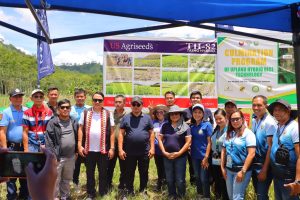
The hybrid rice variety TH-82 NSIC Rc350H showcases resiliency, as featured in a demo farm in Sitio Incalbog, Can-ayan, Malaybalay City, Bukidnon.
MALAYBALAY CITY, BUKIDNON — A demonstration farm in Sitio Incalbog, Can-ayan, featuring the hybrid rice variety TH-82 NSIC Rc350H, has showcased resilience amid the El Niño phenomenon, highlighting its potential to thrive within an upland ecosystem.
This was underscored during a culmination program of the techno demo on August 22, in the said city. This was led by the Department of Agriculture – Northern Mindanao (DA-10) in partnership with the Bukidnon Tagoloanon Mulahay Ha Kabukalagan Agriculture Cooperative (BUKTAMACO), Bukidnon province and Malaybalay City agriculture offices, and SeedWorks Philippines, Inc.
Chona H. Nacalaban, DA-10’s Rice program focal person, emphasized the importance of introducing the hybrid rice technology in upland conditions, and engage members of the Indigenous Peoples (IPs), especially in their ancestral areas with limited rice cultivation.
Launched last February 8, the planted rice variety was initially expected to be harvested by the third week of May, but faced a 58-day delay in maturity due to a significant lack of rainfall from March to May, albeit yielding 2.2 tons per hectare based on crop cut results after receiving rainfall in June.
For his part, Emmanuel F. Piñol, former DA Secretary and an early supporter of the initiative, lauded the demo farm’s success as a significant milestone for Philippine agriculture.
“The ability of this rice variety to survive drought and continue growing, despite a delayed maturity period, underscores its potential to revolutionize rice production in upland areas,” Piñol remarked.
“This breakthrough could allow us to cultivate rice in areas previously reliant on irrigation,” he added, while further noting that it is pivotal in easing the reliance on rice imports and addressing the need to feed the growing population by expanding and improving available tribal areas of the country for rice production.
The demo farm, covering 3,000 square meters, is a precursor to developing the 300 hectares within the BUKTAMACO ancestral domains, which overall seeks to implement sustainable farming practices tailored to upland environments, at the same time bolstering food security in the region.# (BJCE)
